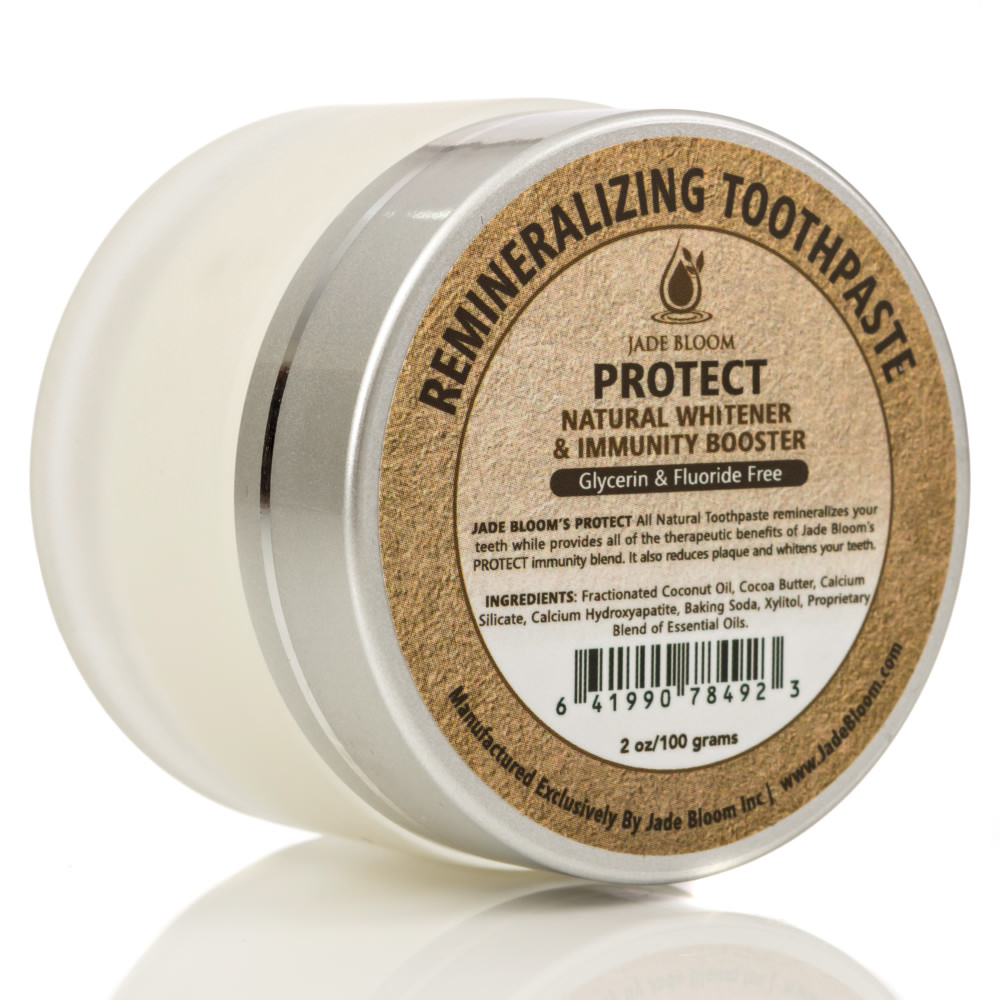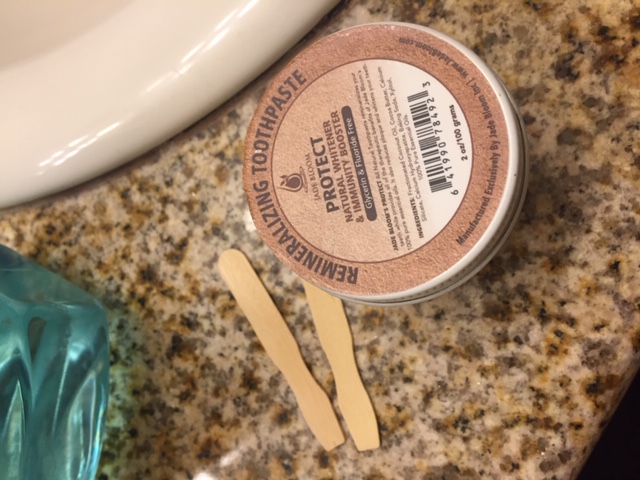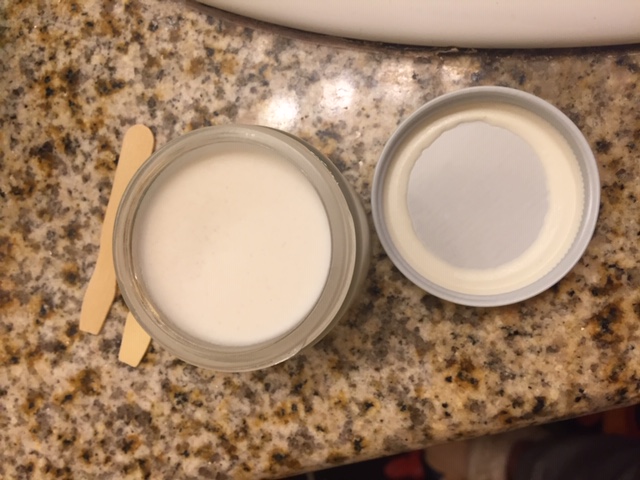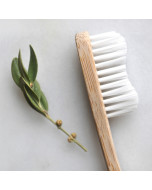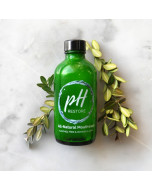Toothpaste - PROTECT Remineralizing - Natural Whitener & Immunity Booster
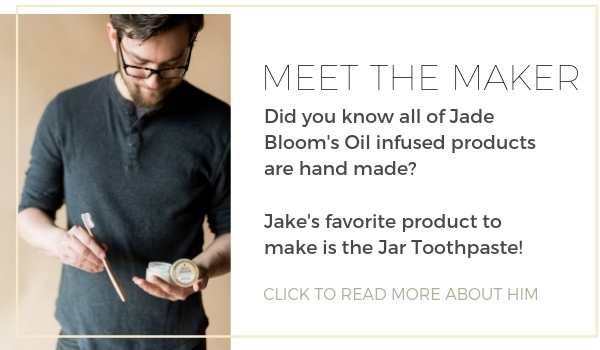
TOOTHPASTE PROTECT - Remineralizing, Whitening, Immunity Booster, & All Natural
"A NON-TRADITIONAL TOOTHPASTE WITH NON-TRADITIONAL RESULTS"
PROTECT actually remineralizes your teeth over time and boosts your immune system with continued use. It is a superior, all-natural formulation that is completely glycerin free. Most commercial toothpaste use glycerin, but recent studies show that glycerin prohibits tooth remineralization and even lowers enamel microhardness. Discover PROTECT Toothpaste made with 100% pure essential oils; the last toothpaste you'll ever buy.
Please note: Our commitment to the absolute best all natural ingredients for this toothpaste makes the consistency of this formulation sensitive to high temperatures of some locations during shipment. If your toothpaste arrives as a liquid, simply put it in the freezer for 1 to 2 hours before first use.
**Our remineralizing toothpaste is available in 2oz or 4oz jars. To keep our pricing low and to pass along a 14% savings on our 4oz bottles, we use the same label for both bottles. Regardless of the jar size, you choose the label indicates 2oz.**
Toothpaste - Protect Remineralizing Natural Whitener & Immunity Booster
Infused with 100% Pure Essential Oils
Features
1. Remineralizes Tooth Enamel
2. Boosts Immunity
3. Naturally Whitens Teeth
4. Unique Flavors Made From 100% Pure Essential Oils Tastes Great
5. Naturally-Occurring Menthol Leaves Your Mouth Feeling Fresh & Clean
6. Every Ingredient Is All Natural With No Use Of Glycerin, Fluoride, Triclosan, SLS, Artifical Sweeteners, Propylene Glycol, DEA, or Microbeads
7. Available In 12 Flavors. Kid's Love them!
How To Use
1. Remove the lid from the glass jar.
2. Use the included spatula to remove a pea size amount of PROTECT toothpaste from the container and apply it to your toothbrush. Alternatively, because of the antimicrobial properties of the essential oils, you may also dip your toothbrush directly into the glass jar.
3. Brush your teeth as normal for 2 minutes.
4. For best results rinse your mouth with Jade Bloom's pH Restore - All Natural Mouthwash, and avoid putting products in your mouth that contain glycerin or alcohol.
The Science Behind The Ingredients We Use
Calcium Hydroxyapatite or Nano-Hydroxyapatite -- The calcium in our teeth exists in a crystalline form that creates a lattice-like structure known as hydroxyapatite. This key ingredient is very unique and extremely important in promoting enamel remineralization. The U.S National Library of Medicine published a study in 2014 saying that Hydroxyapatite "is certainly superior to conventional fluoride, and [has] good results on the sensitivity of the teeth." Hydroxyapatite, as an ingredient in toothpaste, is more expensive than flouride, but can effectively remineralize our teeth when glycerin isn't present. Jade Bloom is one of the first makers of toothpaste to include this ingredient in their formulation.
Click Here To Read The Study Performed By The U.S. National Library Of Medicine On Hydroxyapatite
Click Here To Read More About The Chemical Structure of Hydroxyapatite on Wikipedia
Calcium Silicate -- The secret behind the regeneration of tooth enamel comes from the right balance of Calcium Silicate with Calcium Hydroxyapatite in the absence of glycerin. The food grade Calcium Silicate used by Jade Bloom is a white free-flowing powder derived from limestone and diatomaceous earth. In a recent study by the U.S National Library of Medicine, they concluded that toothpaste using Calcium Silicate "was able to re-harden acid-challenged tooth enamel to a greater extent than a normal fluoride toothpaste." This is a relatively new ingredient that is more commonly used in toothpaste formulations by companies looking to rebuild tooth enamel and the results have been very promising from the studies we have seen.
Click Here To Read The Study Performed By The U.S. National Library of Medicine on Calcium Silicate
Baking Soda (also known as bicarbonate of soda) -- We use a small amount of baking soda in our formulation to provide natural whitening and to act as a mild abrasive for the plaque. Baking soda can effectively whiten teeth by removing stains caused by foods and beverages. The U.S. National Library of Medicine performed a study in 2011 specifically to determine if toothpaste containing baking soda were more effective at removing plaque than toothpaste not containing baking soda. The conclusion from the study was positive and also determined that plaque removal was also much more effective in hard to reach areas of the dentition.
Click Here To Read The Study Performed By The U.S. National Library of Medicine on Baking Soda
Fractionated Coconut Oil -- Coconut oil provides many different health benefits for our body and mouths. Additionally, in Jade Bloom's formulation, it helps create a natural pasty consistency that people are used to feeling in their mouth when brushing their teeth. When coconut oil is fractionated it removes the long chain of triglycerides known as lauric acid. Once this fatty acid is removed the oil remains liquid at cooler temperatures whereas non-fractionated coconut oil becomes a solid at any temperature below 76 degrees Fahrenheit. Fractionated coconut oil is commonly used holistically in the practice of "oil pulling" to help clear the gums of bad bacteria although there currently aren't scientific studies supporting or disapproving the effectiveness of this practice. Studies do show, however, that coconut oil is effective in attacking streptococcus mutant bacteria which causes cavities.
Click Here To Read The Study In The British Dental Journal on Coconut Oil Inhibiting Cavities
Cocoa Butter -- Also known as theobroma oil, Cocoa Butter is a pale yellow, edible vegetable fat extracted from the cocoa bean. It has a subtle cocoa flavor and aroma. The combination of Fractionated Coconut Oil and Cocoa Butter gives PROTECT toothpaste its perfected consistency for easy removal from our glass jars. Cocoa Butter is a very stable fat with a shelf life of five years. In addition to providing a boost to your immune system, Cocoa Butter has a plethora of health benefits for your body that we recommend you research. You'll discover why Jade Bloom decided to use this wonderful product to create the base for PROTECT toothpaste.
Click Here To Read More About Cocoa Butter on Wikipedia
Xylitol -- A naturally occurring carbohydrate that Jade Bloom uses to sweeten the flavor of PROTECT toothpaste. Although the research on the benefits that Xylitol can provide for our teeth is new, the U.S. National Library of Medicine does acknowledge that "data from recent studies indicate that xylitol can reduce the occurrence of dental caries in young children, schoolchildren, and mothers, and in children via their mothers."
Click Here To Learn More About Xylitol
Click Here To Read The Statement From The U.S. National Library of Medicine On Xylitol
PROTECT Immunity Blend of Essential Oils -- Jade Bloom's PROTECT blend of 100% pure essential oils contains Clove, Lemon, Cinnamon Bark Ceylon, Eucalyptus, and Rosemary. This blend of essential oils boosts immunity and promotes good health.
Click Here To Learn More About Jade Bloom's PROTECT Immunity Blend of Essential Oils
Peppermint Essential Oil -- Jade Bloom's 100% Pure Peppermint Essential Oil is the highest quality essential oil in the world with a very high menthofuran content. The natural occurring menthol leaves your breath feeling fresh and clean.
Click Here To Learn More About Jade Bloom's 100% Pure Peppermint Essential Oil
The Science Behind The Ingredients We Didn't Use
Glycerin -- Is a colorless, odorless, viscous liquid also known as glycerol. It's no wonder that almost every conventional toothpaste makers use glycerin in their formulation because it is cheap, keeps toothpaste from drying out, allows it to easily be squeezed from a tube, and even tastes sweet in our mouths. The problem with glycerin is it creates a film on our teeth that can't be rinsed away and it can take days before it completely wears off. The film affects the ability of our saliva to naturally protect our teeth. The U.S. National Library of Medicine performed a study with glycerin on teeth and reported that the microhardness of tooth enamel decreased with continued use. The results of the study concluded that "glycerin and their associations may change the microhardness of sound and demineralized dental tissues." Another study showed that glycerin mouth cleaning swabs used by hospitals may actually cause dental erosion.
Click Here To Read More On The Study on Glycerin By The U.S. National Library of Medicine
Click Here To Read More About Glycerin on Wikipedia
Fluoride -- A naturally occurring and inorganic element that is widely used throughout the dental industry. Fluoride has been shown to reduce cavities by making tooth enamel more resistant to plaque and sugars in the mouth. Studies also show it may effectively reverse the signs of early tooth decay. Although the benefits of fluoride for our teeth have been known and understood for decades to a degree that cities have legally passed fluoridation of central water sources, there is growing interest and even extensive studies to understand the dangers of fluoride in recent years. The U.S. government department is known as the EHP (Environmental Health Perspectives) performed an extensive study on the neurotoxicity caused in children from high exposures to fluoride and concluded that "the results support the possibility of an adverse effect of high fluoride exposure on children’s neurodevelopment." Water fluoridation practices to this day still exist in 70% of the communities within the U.S. even though studies clearly show that the rates of tooth decay are not lower in those cities that choose to fluoridate the water and the rates of tooth decay do not increase within those cities that vote to stop water fluoridation. The Fluoride Action Network has been working to educate the public and lawmakers on these surprising statistics and has compiled a list of 50 reasons that the practice of water fluoridating should cease. Health.gov published a report on the major findings of the risks of over-fluoridation to be cancer, dental fluorosis, and bone fractures (see below to read this study).
Click Here To Read More About The Study of Neurotoxicity From Flouride By The EHP
Click Here To Read 50 Reasons Why Water Fluoridation Should Stop By The Fluoride Action Network
Click Here To Read Major Findings Of The Risks of Fluoride By Health.Gov
Triclosan -- The popular toothpaste, Colgate Total, contains an antibacterial chemical called triclosan, which allows the company to tout it as the “only toothpaste approved by the FDA to help fight plaque and gingivitis.” But while triclosan has been shown to help prevent gingivitis, the benefit comes at a steep price. The chemical has been linked to concerns over antibiotic resistance and endocrine disruption. Endocrine-disrupting chemicals are a serious concern, as they can promote a wide variety of health problems, including breast, ovarian, prostate, and testicular cancer, preterm and low birth weight babies, precocious puberty in girls, and undescended testicles in boys. Some animal studies showed that triclosan caused fetal bone malformations in mice and rats, which may hint at hormonal effects. Further, triclosan may interfere with a type of cell signaling in brain, heart, and other cells, such that researchers noted it “may not be worth potential risks.” The chemical has also been linked to cancer, with research finding triclosan may promote breast cancer progression. The state of Minnesota has already banned most uses of triclosan, but it’s still widely sold across the US in toothpaste, hand soap, makeup, and more. Toothpaste appears to be one of the most potent delivery vehicles for the chemical, as research found people who brushed their teeth with Colgate Total had more than five times as much triclosan in their urine as those who did not. (see below for data compiled by Dr. Mercola)
Sodium Lauryl Sulfate (SLS) -- Many kinds of toothpaste contain surfactants like sodium lauryl sulfate, sodium laureth sulfate (SLS), or sodium lauryl ether sulfate (SLES). Surfactants are chemicals responsible for the foaming action of the toothpaste, but they also interfere with the functioning of your taste buds by breaking up the phospholipids on your tongue. This enhances bitter tastes and is thought to be the reason why everything tastes so bad right after you've brushed your teeth. Not to mention, SLS has even been linked to skin irritation and painful canker sores, with research suggesting an SLS-free toothpaste should be used for people with recurring sores. However, one of the main problems with SLS is that the manufacturing process (ethoxylation) results in it being potentially contaminated with 1,4 dioxane, a carcinogenic byproduct. The manufacturing process also releases carcinogenic volatile organic compounds into the environment. SLS is also registered as an insecticide and may have toxic effects on marine life, including fish, insects, and crustaceans. The manufacturers actually tried to get approval to market SLS as a pesticide for organic farmers, but the application was denied because of its potential for environmental damage. (see below for data compiled by Dr. Mercola)
Artifical Sweeteners -- Aspartame and other artificial sweeteners are often added to commercial toothpaste. Aspartame is primarily made up of aspartic acid and phenylalanine. The phenylalanine has been synthetically modified to carry a methyl group, which provides the majority of the sweetness. That phenylalanine methyl bond, called a methyl ester, is very weak, which allows the methyl group on the phenylalanine to easily break off and form methanol. You may have heard the claim that aspartame is harmless because methanol is also found in fruits and vegetables. However, in fruits and vegetables, the methanol is firmly bonded to pectin, allowing it to be safely passed through your digestive tract. Not so with the methanol created by aspartame; there it's not bonded to anything that can help eliminate it from your body. That's problem number one. Problem number two relates to the fact that humans are the only mammals who are NOT equipped with a protective biological mechanism that breaks down methanol into harmless formic acid. In humans, the methyl alcohol travels through your blood vessels into sensitive areas, such as your brain, where the methanol is converted to formaldehyde. And since there's no catalase present, the formaldehyde is free to cause enormous damage to your tissues. Symptoms from methanol poisoning are many and include headaches, ear buzzing, dizziness, nausea, gastrointestinal disturbances, weakness, vertigo, chills, memory lapses, numbness, and shooting pains in the extremities, behavioral disturbances, and neuritis. (see below for data compiled by Dr. Mercola)
Propylene Glycol -- Propylene glycol is a type of mineral oil that, in the industrial grade, is used in antifreeze, paints, enamels, and airplane de-icers. The -grade form is used in many personal care products, including toothpaste, as a surfactant. Research on the safety of propylene glycol in personal care products is lacking, although it’s a known skin, eye, and lung irritant and may cause organ system toxicity. This is clearly not a substance you want to be brushing your teeth with. (see below for data compiled by Dr. Mercola)
Diethanolamine (DEA) -- DEA is found in many foaming products such as toothpaste. It’s a known hormone disrupter and can react with other ingredients to form a potential carcinogen called NDEA (N-nitrosodiethanolamine), which is readily absorbed through the skin and has been linked with cancers of the stomach, esophagus, liver, and bladder. The Environmental Working Group (EWG) ranks DEA as a number 10 in its cosmetics database (the most toxic score) due to high concerns of organ system toxicity, contamination concerns, and irritation, along with moderate cancer risk. The California Environmental Protection Agency lists DEA as a possible human carcinogen. (see below for data compiled by Dr. Mercola)
Microbeads -- Microbeads are tiny plastic pellets found in body washes, facial scrubs, toothpaste, and more. The microbeads go down your drain, through the filters at most wastewater treatment plants, and out into the environment. Plastic microbeads absorb toxins from the water and are eaten by a wide variety of marine life and, ultimately, by humans as well. There’s good reason to boycott any toothpaste containing microbeads, even aside from the obvious environmental threat. Last year, a Dallas dental hygienist reported finding the microbeads in patients’ teeth. The bits were found in Crest microbead toothpaste and were getting trapped under patients’ gums. This gives food and bacteria an entrance to your gum line, which could actually cause gum disease. Procter & Gamble, which makes Crest, reported they would stop using the microbeads by 2016 as a result. But while it seems the use of microbeads is on its way out, the Personal Care Products Council (PCPC) is lobbying to have microbeads made from biodegradable plastic such as polylactic acid (PLA) remain in personal care products.
Click Here To Read About Toxic Ingredients Used In Toothpastes By Dr. Mercola
Frequently Asked Questions
Question: Why doesn't your toothpaste come in a tube?
Answer: We all love the convenience of squeeze tubes. Glycerin is the main effective ingredient in commercial toothpaste that creates the silky smooth foaming feeling we're used to with toothpaste. It also keeps toothpaste from drying out and makes it easy to squeeze out of a tube. However, the science is conclusive in recent studies that glycerin coats the teeth and does not rinse off. This coating prohibits tooth remineralization and we believe that many consumers will find that eliminating glycerin from toothpaste formulations is an acceptable trade-off to receive the added benefit of regenerating tooth enamel. (see above section for links to studies performed)
Question: Can this toothpaste actually remineralize my teeth and stop cavities?
Answer: Yes it can. See studies performed above on the benefits of the natural ingredients used in our toothpaste formulation for calcium hydroxyapatite and calcium silicate.
Question: Can this toothpaste help with my teeth and gums sensitivity?
Answer: Yes, according to the U.S. National Library of Medicine, the main ingredient in our toothpaste (calcium hydroxyapatite), is superior to fluoride and has "good results on the sensitivity of teeth."
Question: What are essential oils and why are they in this toothpaste?
Answer: This is a great question and we have actually created a short 3-minute video to introduce you to the wonderful healing world of essential oils. Click here to watch the introduction to essential oils now.
Question: Who is Jade Bloom?
Answer: Contrary to popular belief, Jade Bloom is not the name of a person. It is the name of the fastest growing essential oils company in the world that grows, distills, and bottles 100% pure essential oils and oil infused products such as this toothpaste. Click here to watch our 2-minute video to learn more about Jade Bloom.
Question: What does this toothpaste taste like?
Answer: The flavor of this toothpaste is unique and stems from the combination of essential oils we chose to use to boost immunity. We use 6 different 100% pure essential oils: Peppermint, Clove, Lemon, Cinnamon Bark Ceylon, Rosemary, and Eucalyptus. The flavor can be best described as minty with a cinnamon undertone.
Question: Can I return this toothpaste if I don't like it?
Answer: Yes absolutely! Jade Bloom stands behind every product we sell with our Double Guarantee that allows you to sample any of our products risk-free. If you are not completely satisfied with this toothpaste then not only can you return it for a full refund, but we will pay the shipping costs in both directions. Click here to read our Double Guarantee.
Question: Is there a way to sample this toothpaste for free?
Answer: Yes we have 2 options. You can purchase it and sample it risk-free. If you are not fully satisfied then take advantage of our Double Guarantee that provides you with a full refund and Jade Bloom covers the shipping costs in both directions. Also, Jade Bloom provides every U.S. household with the ability to sample $30.00 in free products by enrolling for free in Jade Bloom University to increase your knowledge in natural health and healing. Click here to learn more about Jade Bloom University.
Question: Are there any synthetic or harmful ingredients in this toothpaste?
Answer: No there are not. Every ingredient we use is all natural and safe to use. See the section above about "The Science Behind The Ingredients We Use".
Question: Are there any other benefits to using this toothpaste over traditional toothpaste not already listed?
Answer: Yes there are. Because our toothpaste doesn't use water like many other kinds of toothpaste, this toothpaste won't dry out like traditional toothpaste do if you leave the lid off. That means if you leave the cap off of this toothpaste, no matter how long it is exposed to the air, it will always stay the same consistency at room temperature and will never dry out. Also, many people with arthritis in their hands have reported that it is difficult to squeeze toothpaste from a tube, so they really appreciate the convenient and pain-free design of a jar of toothpaste.
Disclaimer:
The above statements have not been evaluated by the FDA
This information is for educational purposes only, it is not intended to treat, cure, prevent or, diagnose any disease or condition. Nor is it intended to prescribe in any way. This information is for educational purposes only and may not be complete, nor may its data be accurate.
Safety precautions: Extremely potent use with care. Consult a professional reference for correct dilution ratios prior to application.
Avoid in pregnancy and lactation. Keep away from eye area. Keep out of reach of children.
You won't find a higher quality, more effective natural toothpaste anywhere
| UPC Barcode | 641990784923 |
|---|
Customer Reviews
recommend this product

